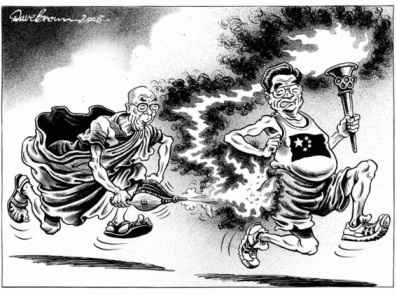
There's a meme* that burns me, amid the protests over the Olympics & human rights.
[Cartoon courtesy of The Independent (UK)]
It's this one: "The Olympics are an event of athleticism first, and then of cultural exchange & world peace. In any case, they should not be politicized." It's one of Beijing's favorite lines, its (and our) less savory allies like Putin and Musharraf are also fond of it, and Beijing claims that even UN Secretary-General Ban Ki-Moon is mouthing this stance, although he's also not attending the opening ceremony -- but didn't specify his reasons. Worst of all, the Olympics' corporate sponsors have used this pathetic line.
At least three reasons why this is ridiculous come to mind:**
1. Most obviously to me, China is reaping huge political benefits from hosting the Olympics. What better stage to show off how rapidly the economy is growing, the social harmony it's achieved, etc.? And thereby to argue for its place among the world's foremost powers. Well, if a country tries to show off its strengths and virtues, it should also expect to have its warts examined. Whether we call that political or not, it's logical that the high visibility will have upsides and downsides, no matter what the government would prefer to focus on.
2. It's one thing to argue that, say, athletes shouldn't "politicize" the Games -- although I'm a big fan of the clever, subtle actions of Team Darfur. But when you're talking about attendance at the Games by a foreign head of state, the UN Secretary-General, or the like, how can his/her presence or absence not be political? If s/he attends it's effectively a political statement of support for the Games, and that statement should be made as a conscious choice, with due regard to whether attending or not sends the better message.
3. This may seem like a naive, pedantic, lawyerly point, but the campaigns to press for human rights in China & Tibet, Darfur and Burma aren't about politics. They're about basic human rights, which aren't (or shouldn't be) a matter of political choice. Human Rights Watch made this point well last week:
Several Olympic sponsors claim erroneously that human rights concerns are “political,” when in fact human rights provide the foundation on which legitimate political activity can take place.
“Human rights should be fundamental to any lawful society and serve as the bedrock principles of Olympism,” said [HRW's Arvind] Ganesan.
When the Olympic sponsors make great, sweeping statements about the beauty, honor and purity of the Games, and how they shouldn't be politicized, I have a fourth gagging, cynical reaction: The Olympic ideals of athletic excellence, intercultural harmony and world peace have already been deeply diluted by your crass commercialization, so don't try to appeal to those values to argue against "politicization".
* the sociocultural kind, not the Web kind
** these are somewhat contradictory; we lawyers do that -- we even have a term for it: "argument in the alternative"
No comments:
Post a Comment